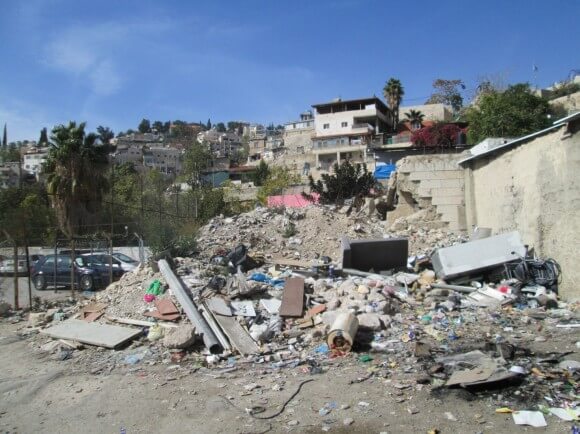The news from Israel Tuesday was that the finance minister had waived all building permit and rezoning requirements so as to allow the U.S. State Department to ramp up construction on a consular building in South Jerusalem that is to become the new U.S. Embassy, perhaps as early as May.
The Times of Israel reported that Minister Moshe Kahlon said he would sign the waiver because moving the embassy is such a political priority:
“As we promised, we won’t let unnecessary bureaucracy delay the move of the American embassy to Jerusalem, Israel’s eternal capital,” he said in a statement. “…This is a strategic diplomatic move for the State of Israel.”
Israel’s i24 channel said this would save months or years of delays, and Yaacov Lozowick, the Israeli archivist, celebrated: “The elected politicians have succeeded in twisting the arms of the bureaucrats. This is no small feat.”
The green light for the Americans only highlights the red light that Palestinians almost invariably get under the same system. They can’t even wait months or years; their plans to build are routinely denied because Israel is seeking to frustrate the growth of Palestinian areas. And when they do build, Israel often comes in with bulldozers to demolish the construction. A whole organization, the Israeli Committee Against House Demolitions, arose to fight this pattern; nearly 1000 Palestinian buildings are destroyed every year. The phrase that appears most frequently in its reports is this:
The house was demolished on grounds of lacking an Israeli-issued building permit.
The human rights organization Adalah reported last year that permits are unobtainable to Palestinians, whether in Israel or in occupied Jerusalem:
official permits … are technically unobtainable to [Palestinians] due to decades of systematic discrimination against Palestinian citizens of Israel in land allocation, and deliberate neglect of the land and housing rights and needs of the occupied Palestinian population in Jerusalem
Adalah said that a law passed last year “gives the state expanded administrative powers to demolish homes and seek prison sentences and more severe financial penalties as punitive measures for breaches of the state’s discriminatory planning and building laws.”
The building-permit process is an administrative figleaf for unequal treatment; and worse, the process is an instrument that is used by the state to stifle Palestinian life, economy and culture. This is not the “rule of law,” which means that the law is applied evenly to everyone. Because the law is always applied differently when it comes to Palestinians. Though if you’re in the right group you get rubber-stamped, because you’re in the “strategic” interest of the state.
So the good news for the special relationship between Israel and the U.S. illuminates something else: the bureaucracy of apartheid.
Thanks to Allison Deger.



RE: “The news from Israel Tuesday was that the finance minister had waived all building permit and rezoning requirements so as to allow the U.S. State Department to ramp up construction on a consular building in South Jerusalem that is to become the new U.S. Embassy, perhaps as early as May.” ~ Scott Roth and Phil Weiss
MY COMMENT: I wonder if Israel is doing likewise for Jimmy Morales and Guatemala, or does only the U.S. get this special treatment? I also wonder whether Sheldon Adelson has offered to pay for Guatemala to move its embassy. He certainly should! Or, is the U.S. somehow paying for it?
■ In nod to Trump, Guatemala sets Jerusalem embassy move two days after the U.S.
http://www.foxnews.com/world/2018/03/05/in-nod-to-trump-guatemala-sets-jerusalem-embassy-move-two-days-after-u-s.html
Mar 5, 2018 – Guatemala plans to move its embassy in Israel to Jerusalem in May, just two days after the U.S. embassy makes the same move from Tel Aviv, Guatemalan President Jimmy Morales announced …
■ ALSO SEE: “Kosher Industry’s Woes Reach a Poor Village in Guatemala” | By Summer Harlow | Forward.com | December 24, 2008
ENTIRE ARTICLE ➤ https://forward.com/news/14768/agriprocessors-raid-shatters-dreams-in-guatemalan-03014/
■ P.S. AND SEE: “Trump and the Meat Tycoon: Backstory to a Commutation” | by Martha Rosenberg | CounterPunch | December 25, 2018
After he served 8 years of a 27-year sentence for money laundering, Agriprocessors meatpacking executive Sholom Rubashkin had his sentence commuted by President Trump.
LINK ➤ https://www.counterpunch.org/2017/12/25/trump-and-the-meat-tycoon-backstory-to-a-commutation/
“…unnecessary bureaucracy delay…”
But, for everyone else we will leave the unnecessarily crippling system in place because it serves a dual purpose. Institutional bribery and ethnically punitive.